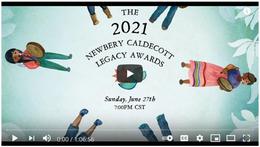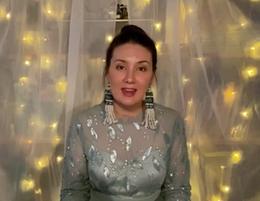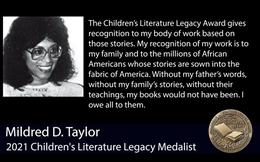

|
|
| Michaela Goade | |
Michaela Goade, in her acceptance speech for the 2021 Caldecott Medal for We Are Water Protectors (Roaring Brook Press), pointed out she is the first Indigenous person and BIPOC woman to receive the Caldecott Medal award in its 83-year history.
Goade spoke to the audience from Southeast Alaska--lands her ancestors have stewarded, she said, "since time immemorial." She continued, "It is a daunting thing to be called upon to put into words what I normally choose to communicate through art." She went on to describe these lands, of 1,000 islands, "where sea blends into sky... a kaleidoscope of glaciers and fjords, rivers and waterfalls, lakes, bogs… everything eventually leading to the sea." In her art, she wished to show what it means to be in relationship with the land and to nourish the spirit of a future water protector. The 2016 Standing Rock Water Protectors became the largest intertribal alliance in documented history. "I contemplated how sorrow, frustration and anger wove together with courage, resiliency and hope, and how the art might speak to this gravity," Goade said. "I hope children meet the story feeling seen and celebrated... and empowered."

|
|
| Tae Keller | |
The 100th Newbery Medal was presented to Tae Keller for When You Trap a Tiger (Random House Books for Young Readers). "This year feels different," Keller began. "Instead of standing at a podium, I am sitting at my writing desk, the same one that has seen me through drafts of various projects,... the same one I sat in when the committee told me over Zoom that I'd won." Keller said that when Dr. Jonda C. McNair, 2021 Newbery chair, invited Keller to speak to her students at Ohio State University, she asked Keller, "What does the tiger represent?" Keller, in disarming fashion, said she felt unprepared for the question: "Identity, courage, death, hope," but as time went on, the tiger came to represent a question: "Why do we tell stories?" Her speech took an unexpected turn and she asked listeners to reflect on the year just passed, the preciousness of life, of family, of stories.
"Writing is the thing that makes me feel most like myself," Keller said. "Why I write and why we tell stories are not the same question. Her Halmoni's (grandmother's) stories took Keller to Korea, when Tiger walked like man, and spoke, and little girls could shapeshift. "Stories connected me to my family, this impossibly huge world felt small again. We tell stories because they connect us to the world and guide us back to ourselves. Stories show us who we are. And without stories, who are we?"
 Mildred Taylor gave her acceptance by audio recording, describing how it took her years to get her first book, Song of the Trees, published, and how she tried several narrative approaches before finding the voice of Cassie Logan--a voice Taylor called a blend of her aunt, her sister and herself.
Mildred Taylor gave her acceptance by audio recording, describing how it took her years to get her first book, Song of the Trees, published, and how she tried several narrative approaches before finding the voice of Cassie Logan--a voice Taylor called a blend of her aunt, her sister and herself.
"For readers, the Logan family is fiction," she said, "but to me they are real people, for each member of the Logan family I describe is drawn from a memory of my family, and the land I describe is my family's land." Taylor spoke of the images of Black people in the textbooks at school, and how they were nothing like the people she knew. "I wanted to show a different kind of Black world from the one then so often portrayed. I wanted to show a family united in love and self-respect; and parents, strong and sensitive, attempting to guide their children successfully, without harming their spirits, through the hazardous maze of living in a discriminatory society." --Jennifer M. Brown

